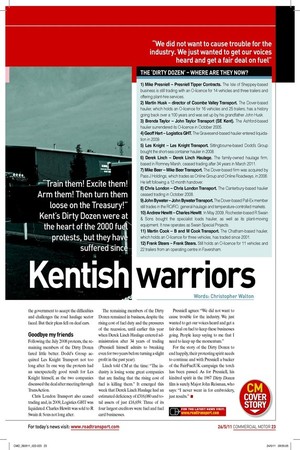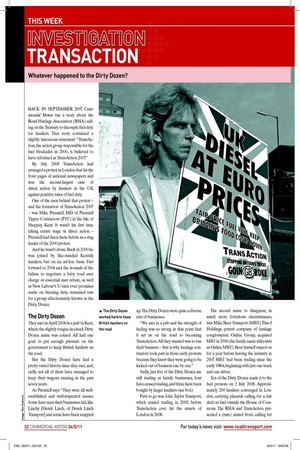Kentish warriors
Page 17

Page 16

If you've noticed an error in this article please click here to report it so we can fix it.
Words: Christopher Walton
BACK IN SEPTEMBER 2007, Commercial Motor ran a story about the Road Haulage Association (RHA) calling on the Treasury to decouple fuel duty for hauliers. That story contained a slightly innocuous statement: “TransAction, the action group responsible for the fuel blockades in 2000, is believed to have reformed as TransAction 2007.” By July 2008 TransAction had arranged a protest in London that hit the front pages of national newspapers and was the second-largest case of direct action by hauliers in the UK against punitive rates of fuel duty.
One of the men behind that protest – and the formation of TransAction 2007 – was Mike Presniell, MD of Presniell Tipper Contractors (PTC) in the Isle of Sheppey, Kent. It wasn’t his irst time taking centre stage in direct action – Presniell had been there before as a ring leader of the 2000 protest.
And he wasn’t alone. Back in 2000 he was joined by like-minded Kentish hauliers, but on an ad-hoc basis. Fast forward to 2004 and the wounds of the failure to negotiate a lorry road user charge or essential user rebate, as well as New Labour’s U-turn over promises made on freezing duty, remained raw for a group affectionately known as the Dirty Dozen.
The Dirty Dozen
They met in April 2004 in a pub in Kent, where the slightly tongue-in-cheek Dirty Dozen name was coined. All had one goal: to put enough pressure on the government to keep British hauliers on the road.
But the Dirty Dozen have had a pretty varied history since they met, and, sadly, not all of them have managed to keep their wagons running in the past seven years.
As Presniell says: “They were all wellestablished and well-respected names. Some have seen their businesses fail, like Linchy [Derek Linch, of Derek Linch Transport] and some have been snapped up. The Dirty Dozen were quite a diverse mix of businesses.
“We met in a pub and the strength of feeling was so strong at that point that it set us on the road to becoming TransAction. All they wanted was to run their business – that is why haulage contractors took part in those early protests because they knew they were going to be kicked out of business one by one.” Sadly, just ive of the Dirty Dozen are still trading as family businesses, four have ceased trading, and three have been bought by larger hauliers (see box).
First to go was John Taylor Transport, which ceased trading in 2005, before TransAction ever hit the streets of London in 2008. The second name to disappear, in much more fortuitous circumstances, was Mike Beer Transport (MBT). Pass J Holdings, parent company of haulage conglomerate Online Group, acquired MBT in 2006 (the family name still exists as Online MBT). Beer himself stayed on for a year before leaving the industry in 2007. MBT had been trading since the early 1980s, beginning with just one truck and one driver.
Ten of the Dirty Dozen made it to the fuel protests on 2 July 2008. Approximately 200 hauliers converged in London, carrying placards calling for a fair deal on fuel outside the House of Commons. The RHA and TransAction presented a (rare) united front, calling for the government to accept the dificulties and challenges the road haulage sector faced. But their pleas fell on deaf ears.
Goodbye my friends
Following the July 2008 protests, the remaining members of the Dirty Dozen fared little better. Dodd’s Group acquired Les Knight Transport not too long after. In one way the protests had an unexpectedly good result for Les Knight himself, as the two companies discussed the deal after meeting through TransAction.
Chris London Transport also ceased trading and, in 2009, Logistics GHT was liquidated. Charles Hewitt was sold to R Swain & Sons not long after. The remaining members of the Dirty Dozen remained in business, despite the rising cost of fuel duty and the pressures of the recession, until earlier this year when Derek Linch Haulage entered administration after 34 years of trading (Presniell himself admits to breaking even for two years before turning a slight proit in the past year).
Linch told CM at the time: “The industry is losing some great companies that are inding that the rising cost of fuel is killing them.” It emerged this week that Derek Linch Haulage had an estimated deiciency of £316,080 and total assets of just £16,659. Three of its four largest creditors were fuel and fuel card businesses. Presniell agrees: “We did not want to cause trouble for the industry. We just wanted to get our voices heard and get a fair deal on fuel to keep these businesses going. People keep saying to me that I need to keep up the momentum.”
For the story of the Dirty Dozen to end happily, their protesting spirit needs to continue and with Presniell a backer of the FairFuelUK campaign the torch has been passed. As for Presniell, his kindred spirit in the 1967 Dirty Dozen ilm is surely Major John Reisman, who says: “I never went in for embroidery, just results.” ■












































